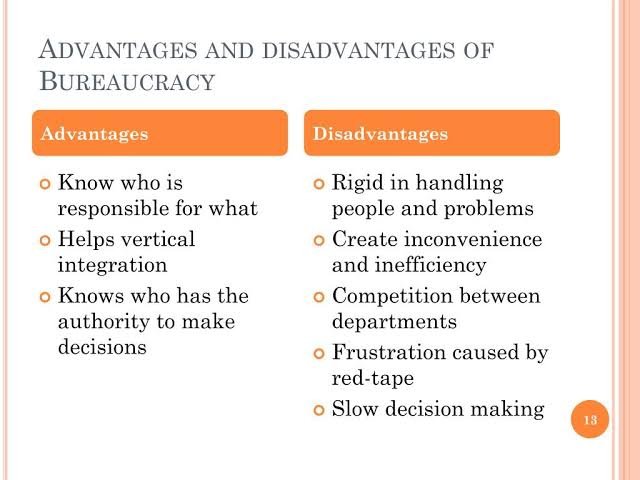Advantages and Disadvantages of Bureaucracy in India
In a parliamentary democracy such as that of India, the administration is carried on by the Council of Ministers. Ministers are collectively and individually responsible to the Parliament. Each administrative department of government is placed under the charge of a minister. The minister is the political head of an administrative department.
But the minister, neither by experience nor by training is an administrator. Administration, being a science by itself, has to be conducted by experts. The expert element in administration is provided by the civil service or the bureaucracy.
Below the minister who contributes the policy decisions, there is the bureaucratic hierarchy, with the secretary to the department at the head. The secretary of the department is the top civil servant with whom the minister comes into close contact in matters of execution of governmental policy.
The relationship between the minister and the bureaucracy is always in a state of unstable equilibrium and is a matter for constant adjustment. The minister as representative of the people has an electoral mandate to fulfill. He has his party and political compulsions.
Advantages of bureaucracy in India
The bureaucrat in India being the President's or the Governor's appointee, and serving during the President's or the Governor's pleasure, has to rise above party considerations. The bureaucrat takes order from the minister and acts accordingly within the limits of the constitution. The civil servants also being administrative experts, remind the minister about the feasibility or otherwise of a particular course of action. Thus the top civil servant has two duties towards his minister:
He has to remind the minister whether or not a particular course of action is constitutionally permitted, and
Whether or not a particular course of action is practically feasible or not. The advice of the top civil servant on both counts is of immense value to the minister.
The Civil Service provides the permanent element in government. As the fortunes of the civil servants do not depend on political vicissitudes, they can take a dispassionate view on political developments. Their long term view of national interest, not colored by immediate political considerations, gives the minister a glimpse of long term interest of the nation.
In India, civil servants enjoy a measure of social respectability not easily attained by people in other professions. Consequently, civil servants in most cases are honest and dutiful. The civil servants also are administrative experts. Hence the ministers have to depend on them.
The bureaucracy, through experience knows what policy is or is not feasible. Hence the minister listens to the advice of the top civil servant as to the desirability of a policy from administrative point of view. Thus in a healthy situation, the minister and the bureaucracy are mutually complementary - the minister contributing the policy decisions and the bureaucracy executing the decisions.
The bureaucracy in India works under the cloak of ministerial responsibility. For every act of the government, the minister is answerable to the Parliament. Though the bureaucracy executes government policies, they remain in splendid anonymity. They do not take part in Parliamentary debates nor are they members of political parties. The actions of the civil servants must be defended by the minister on the floor of the House. This system compels the minister to keep a close watch on the actions of the bureaucracy and the bureaucracy to behave in such a way that the minister is not put into difficulty.
Disadvantages of bureaucracy in India
The bureaucracy in India is however not above criticism.
Firstly, As the bureaucracy has not to own any political responsibility, they become insensitive to popular demands. Government becomes inert and file bound.
Secondly, dependence of the ministers on the civil servants develops a sort 'dictatorship of the bureaucracy”.
Thirdly, the bureaucracy forms a very powerful pressure group, intent on securing group interest. This at times works counter to national interest.
Fourthly, since the bureaucrats execute the orders of the ministers, sometimes creativity on part of bureaucrats gets lost.
Fifthly, bureaucrats often become in-efficient and even resists to positive changes in state policies.
Sixthly, our bureaucratic framework has often been criticized for red-tapism and excessive adherence to rules and regulations leading to a delay in decision making process.
Finally, charges of corruption and bribery against the bureaucracy are rampant.
Yet with all these defects, the bureaucracy is an institution without which democratic governments cannot work. Bureaucracy may be reformed but cannot be done away with.


Post a Comment